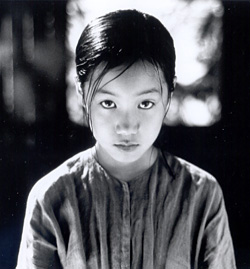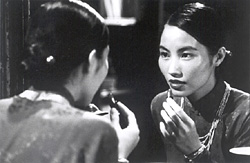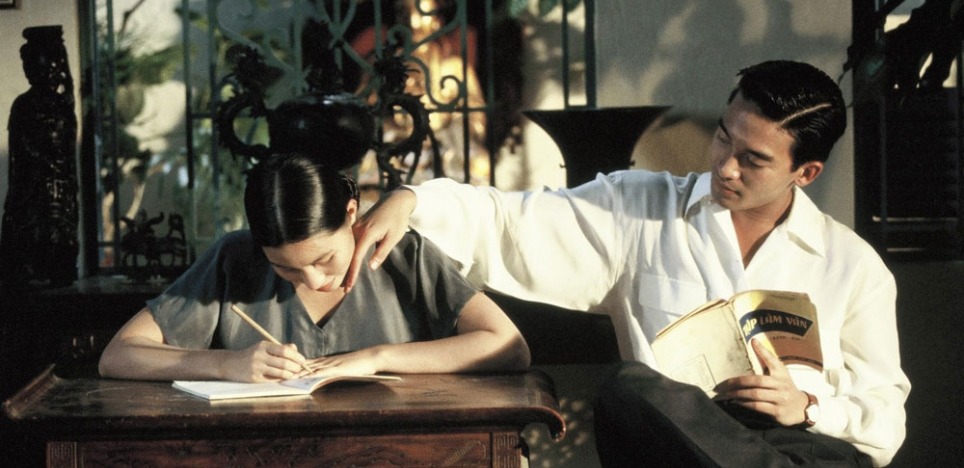
"Just being awake, alert, attentive is no easy matter. I think it is the greatest spiritual challenge that we face."
— Diana Eck
The spiritual practice of attention is essential to a life of wholeness, depth, and meaning. Nearly all the world's religions emphasize how important it is to be mindful. The problem is dozing off and moving through life oblivious to what is going on within and all around us. The challenge is to come alive to the present moment and to practice the art of long looking with love.
The Scent of Green Papaya (1993) is one of the best films ever made about the practice of attention. Vietnamese writer and director Tran Ahn Hung sets the drama in Saigon in 1951. We follow the daily activities of a ten-year-old servant girl who works for a merchant family. She is incredibly attentive to her work and the natural world around her. This gift serves her well years later when she is working in the home of the man she loves.
Hillel, the great Jewish teacher, once asked, "If you are not attending to reality, where are you?" The questions and exercises in this guide are designed to help you explore how to focus your attention.
The Scent of Green Papaya runs 104 minutes and is not rated. For our review of the film and a plot synopsis, click here.
1. DOING ONE THING AT A TIME
"Behaving attentively," writes Timothy Miller in How To Want What You Have, "is primarily a matter of behaving as if every action is important. Doing one thing at a time is one way of acting as if what you are doing is important."
- One of the many marvels of this movie is that it shows how doing chores can be acts of devotion and delight when they are done with clear focus. Which scenes best reveal Mui's ability to do one thing at a time?
- Bestselling author James Hillman makes a good case for attending to chores in the home cheerfully as a hands-on way of expressing love for our possessions and the place where we live. What do you think of this idea?

2. A MAGNIFICENT WORLD
"The moment one gives close attention to anything, even a blade of grass," writer Henry Miller observed, "it becomes a mysterious, awesome, indescribably magnificent world in itself."
- Share your reactions to the two scenes where Mui pays close attention to the magnificent seed world inside an unripe papaya.
- What mysterious, awesome, indescribably magnificent world has caught your attention this week?
3. NATURE SPEAKS
"One should pay attention to even the smallest crawling creatures, for these too may have a valuable lesson to teach us, and even the smallest ant may wish to communicate with a person," Black Elk once stated.
- Discuss the approaches to ants demonstrated by Mui and by the middle son of the household.
- Ecologist and philosopher Thomas Berry challenges us to combat the disease of autism — our inability to communicate with anybody but our own kind. What lesson did you learn from the ant Mui watches? What other things have you picked up from animals?

4. YOUR GAZE BRINGS BLESSINGS
"When you gaze at an object," Dov Baer of Mezritch, a Hasidic sage, wrote, "you bring blessing to it. For through contemplation, you know that it is absolutely nothing without the divinity that permeates it. By means of this awareness, you draw greater vitality to that object from the divine source of life."
- The Scent of Green Papaya is a film that stimulates our senses of seeing, hearing, tasting, touching, and smelling. Let your gaze bring blessing by making a list of your favorite sense-luscious (a term coined by poet Diane Ackerman) scenes in the drama.
- Do this imagery exercise: Close your eyes. See your gaze going out to something. Know how blessings accompany your attention. Then open your eyes.
5. SEEDING OUR RELATIONSHIPS
In A High Spiritual Season, Joan Chittister writes, "What we do to other people can affect their own way of being in the world. In other words, the attention and dignity we give to those around us is the seed of all relationships in the world."
- Talk about the ways Mui's attentiveness and serenity affect those around her, such as the mistress of the household, Mr. Thuan, and Khuyen.
- Who has taught you the most by example or helped you to see the importance of the spiritual practice of attention in relationships?
6. MORALITY AND ATTENTION
"The Buddha spoke of morality as the true beauty of the person," Buddhist scholar and author Joseph Goldstein has written. "In order to honor this commitment to morality, we pay attention to what we do. We wake up to our actions."
- In what sense are all of Mui's actions in this drama expressive of the inner beauty of her person?
- Share your experiences of the deep connection between morality, beauty, and attention.
7. THE LOVE WE ALL LONG FOR
"The things that matter most in our lives are not fantastic or grand," Jack Kornfield has written. "They are moments when we touch one another, when we are there in the most attentive and caring way. This simple and profound intimacy is the love that we all long for."
- Share your feelings about the slow evolution of love between Mui and Khuyen. What is the significance of his teaching her how to read?
- What role has the spiritual practice of attention played in your most meaningful and fulfilling love relationships?
This guide is one in a series of more than 200 Values & Visions Guides written by Frederic and Mary Ann Brussat. Text copyright 2002 by Frederic and Mary Ann Brussat. Photos courtesy of First Look Pictures. This guide is posted as a service to visitors to www.SpiritualityandPractice.com. It may not be photocopied, reprinted, or distributed electronically without permission from Frederic and Mary Ann Brussat. For permission and for a list of guides in the Values & Visions series and ordering information, email your name and mailing address to: brussat@spiritualrx.com.
